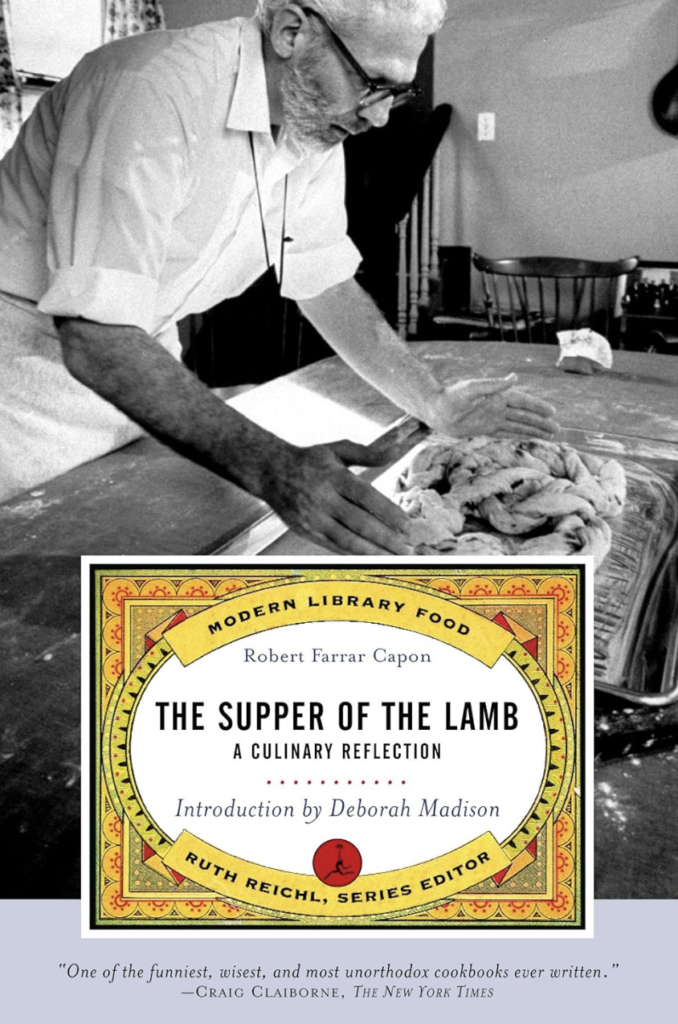A short-but-sweet review (with many quotes) of The Supper of the Lamb: A Culinary Reflection, by Robert Farrar Capon. (Originally subtitled A Culinary Entertainment, which I think is even more fitting.)
This book has been hovering on the edges of my booklist for several years now, not quite making it off the back burner until now. I’ve seen it recommended by multiple authors and finally dove into a library copy.
The Supper of the Lamb is a delight of a book. What other writer can veer from an ode to baking soda as the great solver of heartburn to our figurative heartburn as we wait for the coming supper of the Lamb? This book begins as if it’s a cookbook but leaves plenty of space for the author’s strong opinions on knives, wines, cutting boards, and theological reflections.
While Mr. Capon and I would never see eye to eye theologically, I still came away from the book feeling that he would be a pleasant person with whom to enjoy an evening’s conversation over a good loaf of crusty bread with butter. He would insist on a bottle of wine each and lecture me for disliking wine, and we could discuss the merits of pie, cheese, and the great world yet to come.
Did I save any of the recipes? No. I’ll probably never make sheets of puff pastry or strudel dough, or at least not with small children in the home. But I relished the thought of food as a good gift of God and an opportunity for joy.

Since that conversation is unlikely to happen, this book is a gift that feels like the next best thing. If you’re able to figuratively sit down with an author who might have different opinions from yours–and strong ones at that!–you might enjoy this romp of a semi-cookbook. I’ve included some of my favorite quotes below:
Favorite Quotes from The Supper of the Lamb:
“Idolatry has two faults. It is not only a slur on the true God; it is also an insult to true things.”
chapter 2
“A shout of rejoicing for the fish who wears his eyeballs at the ends of long stalks, and for the jubilant laughter of the God who holds him in life with a daily bravo at the bravura of his being!”
chapter 4
“Man invented cooking before he thought of nutrition. To be sure, food keeps us alive, but that is only its smallest and most temporary work. Its eternal purpose is to furnish our sensibilities against the day when we shall sit down at the heavenly banquet and see how gracious the Lord is. Nourishment is necessary only for a while; what we shall need forever is taste.”
chapter 4
“Food is the daily sacrament of unnecessary goodness, ordained for a continual remembrance that the world will always be more delicious than it is useful. Necessity is the mother only of cliches. It takes playfulness to make poetry.”
chapter 4
“There are more important things to do than hurry.”
chapter 7
“In a general way we concede that God made the world out of joy: He didn’t need it; He just thought it was a good thing.”
chapter 7
“Things are precious before they are contributory. It is a false piety that walks through creation looking only for lessons which can be applied somewhere else. To be sure, God remains the greatest good, but, for all that, the world is still good in itself. Indeed, since He does not need it, its whole reason for being must lie in its own goodness; He has no use for it; only delight. Just think what that means.”
chapter 8
In support of gas over electric stoves:
“Fire is too old a friend to be forsaken for glowing rods.”
chapter 12
“May your men wear their weight with pride, secure in the knowledge that they have at last become considerable. May they rejoice that they will never again be taken for callow, black-haired boys. And your women? Ah! Women are like cheese strudels. When first baked, they are crisp and fresh on the outside, but the filling is unsettled and indigestible; in age, the crust may not be so lovely, but the filling comes at last into its own.”
chapter 15
“We embrace the world in all its glorious solidity, yet it struggles in our very arms, declares itself a pilgrim world, and, through the lattices and windows of its nature, discloses cities more desirable still.”
chapter 16
“For all its rooted loveliness, the world has no continuing city here; it is an outlandish place, a foreign home, a session in via to a better version of itself—and it is our glory to see it so and thirst until Jerusalem comes home at last. We were given appetites, not to consume the world and forget it, but to taste its goodness and hunger to make it great. That is the unconsolable heartburn, the lifelong disquietude of having been made in the image of God.”
chapter 16
Click here for current prices on The Supper of the Lamb, or check your local library.
More book reviews for my fellow readers and self-proclaimed nerds can be found at this link.
Notice: JavaScript is required for this content.